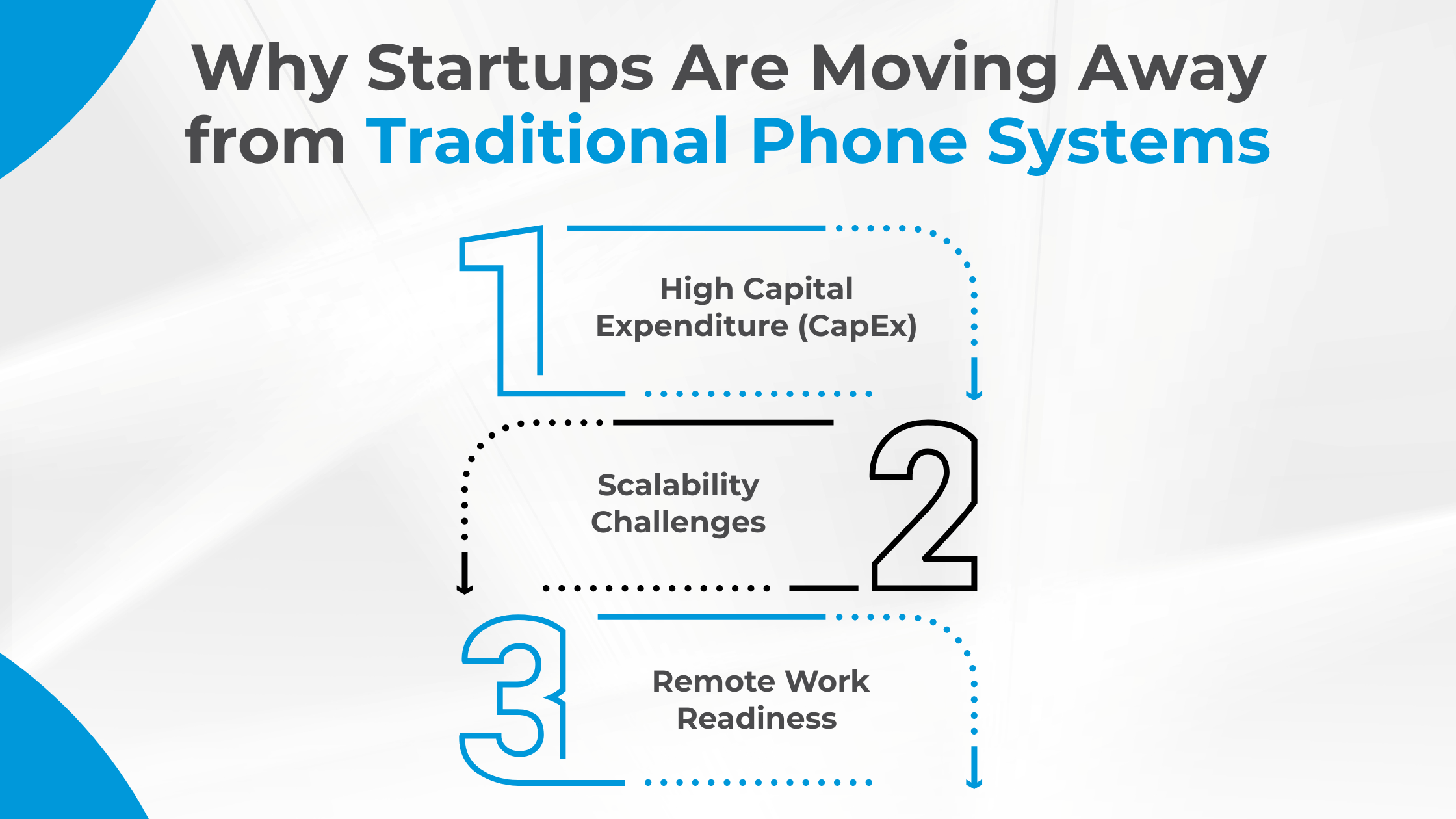In today’s hyper-connected world, startups need to be nimble, cost-efficient, and tech-savvy. One major transformation shaping communication strategies in India’s startup ecosystem is the growing shift toward cloud telephony solutions. Traditional landlines and bulky PBX systems are quickly being replaced with flexible, scalable, and cloud-based alternatives. This change is not just about technology; it’s about redefining how young businesses communicate, serve customers, and scale operations.
This blog explores why startups are switching to cloud telephony solutions in India, the benefits of adopting this approach, and how to identify the best cloud telephony providers in India for long-term success.
Cloud telephony is a communication technology that enables businesses to make and manage calls over the internet, rather than relying on traditional telephone infrastructure. Instead of investing in bulky hardware or maintaining a physical PBX (Private Branch Exchange) system, startups can leverage the cloud to handle all their voice communication needs. This shift to digital calling makes operations more flexible, cost-effective, and scalable, which is why cloud telephony in India is rapidly gaining traction among startups and small businesses.
At its core, a cloud telephony system routes incoming and outgoing calls through a secure internet connection. The backend infrastructure is hosted by a service provider, which means startups don’t have to worry about server maintenance, hardware updates, or system downtime. Calls can be made or received from any device, i.e., laptop, desktop, or smartphone, using virtual numbers or browser-based interfaces.
A cloud telephony solution in India like Kommuno typically comes packed with features such as IVR (Interactive Voice Response), call recording, call analytics, voicemail, number masking, SMS capabilities, and CRM integrations. These features help businesses deliver personalized service, manage large call volumes efficiently, and ensure complete traceability of every customer interaction.
The technology is especially valuable for remote or distributed teams, offering seamless communication from anywhere. Whether you’re handling customer support, making sales calls, or coordinating internally, cloud telephony ensures you stay connected without geographical limitations.
In short, cloud telephony replaces traditional phone lines with a smarter, more agile system designed for modern businesses, and it’s proving to be a game-changer for startups across India.

Traditional telephony requires hardware purchases, ongoing maintenance, and technical know-how. Startups working with limited budgets often cannot afford the upfront investments for setting up on-premise systems. Cloud telephony in India offers an attractive alternative, minimal hardware requirements, predictable monthly costs, and no large capital outlay.
As startups grow, they need to add new employees, departments, and sometimes new locations. Traditional systems are rigid and don’t scale well. Cloud telephony is inherently scalable, and adding new users or lines can be done instantly through a web portal.
The COVID-19 pandemic accelerated remote and hybrid work trends. Startups, often operating without a central office, require communication tools that work from anywhere. Cloud telephony supports this flexibility, allowing employees to handle calls from laptops or mobile phones.
One of the primary reasons for the adoption of cloud telephony in India is the affordability. It eliminates hardware costs, maintenance, and expensive long-distance charges. Most providers offer pay-as-you-go models, making it budget-friendly for startups.
Features like auto-attendants, call queuing, and intelligent routing allow startups to present a professional front to customers. Even with a small team, startups can handle high call volumes, route customers to the right person, and keep track of service quality through call recordings and analytics.
Many cloud telephony solutions in India integrate seamlessly with CRMs like Zoho, Salesforce, or HubSpot. This gives sales and support teams the ability to log calls, access customer data instantly, and personalize interactions, all of which improve productivity and customer satisfaction.
Data-driven decisions are vital for startups. Cloud telephony systems offer real-time dashboards and call analytics that help businesses understand call volumes, response times, missed calls, and agent performance.
Because the infrastructure is cloud-based, it’s protected against local outages or disasters. Even in the case of a power cut or hardware failure, calls can be redirected to mobile devices, ensuring uninterrupted communication.

For online sellers, managing customer service efficiently is critical. Cloud telephony allows e-commerce businesses to set up 24×7 helplines, process order queries, and offer real-time delivery support without setting up call centers.
Startups in education use cloud telephony in India to manage admissions calls, parent-teacher communication, and support services. IVR systems help route callers to appropriate departments, reducing response time.
Telemedicine and health-tech companies rely on call routing and virtual numbers to ensure patient calls are handled confidentially and quickly. Integration with booking systems ensures seamless experiences.
Startups offering last-mile delivery use cloud telephony to connect drivers with customers securely using masked numbers. This protects privacy and improves reliability.
With regulatory compliance and customer trust being vital, fintech firms use call recording, two-factor authentication via IVR, and detailed call logs to enhance security and compliance.
Choosing the right service provider, like Kommuno, can make a significant impact on business operations. Here are some key aspects startups should consider:
Ensure that the provider offers the features your startup needs, such as IVR, call forwarding, call masking, number portability, and CRM integrations. Some industries may need advanced features like speech analytics or voice bots.
A telephony system is critical infrastructure. Choose a provider that guarantees high uptime (99.9% or more) and offers backup solutions for business continuity.
Startups need a partner, not just a vendor. Look for providers with responsive customer service, preferably with a dedicated account manager and 24/7 tech support.
Ensure the provider complies with TRAI regulations and follows best practices in data protection. This is especially important for fintech, healthcare, and legal startups.
Opt for providers that offer clear, scalable pricing without hidden fees. Many of the best cloud telephony providers in India offer packages tailored to startups, with room to grow.
Check online reviews, case studies, and client testimonials. Word-of-mouth and peer recommendations can also guide you to reliable providers with proven results in your industry.
The future of communication for Indian startups is undeniably cloud-based. As AI-driven voice assistants, speech analytics, and multilingual IVR systems continue to emerge, the opportunities are growing swiftly. Startups like Kommuno, which embrace cloud telephony at an early stage, are strategically positioned to take advantage of forthcoming advancements in customer engagement, automation, and real-time personalization.
Moreover, as 5G rolls out across the country, the performance of cloud-based applications, including telephony, will only get better. This promises even more speed, reliability, and lower latency, encouraging further adoption.
Implementing a cloud telephony solution in India can transform your startup’s communication infrastructure, but to unlock its full potential, you need a thoughtful approach. Here are essential tips for a successful rollout:
Before implementation, identify what you want to achieve, whether it’s improving customer support, boosting lead response time, or streamlining internal communication. Clear goals will guide setup and feature selection.
Select from the best cloud telephony providers in India based on your startup’s scale, industry needs, and projected growth. Look for a provider offering strong support, reliability, and integration capabilities.
Ensure your staff understands how to use the new system. Conduct training sessions to cover features like IVR navigation, call routing, voicemail handling, and CRM integration. A well-informed team ensures smoother adoption.
Begin with a pilot phase involving a small group or department. Monitor system performance, user experience, and customer feedback. Once confident, scale the solution across teams or locations.
Tailor IVR scripts, call routing, and dashboards to suit your workflows. Personalization enhances efficiency and improves customer experience.
Use the analytics and reports offered by your cloud telephony system to track KPIs such as call volume, response times, and agent performance. Regularly review the data to make improvements.
With a structured rollout and continuous optimization, cloud telephony at Kommuno can deliver measurable results for your startup.
Cloud telephony is rapidly becoming the go-to communication solution for Indian startups, and for good reason. It offers flexibility, scalability, cost-efficiency, and a suite of smart features that traditional phone systems simply can’t match. In a competitive startup ecosystem, being able to deliver seamless customer service, enable remote work, and track communication performance can make a significant difference. With minimal setup and easy integration into existing workflows, a cloud telephony solution empowers startups to operate like seasoned enterprises.
As digital transformation accelerates across India, this technology will continue to shape the future of business communications. For founders and entrepreneurs looking to gain an edge, investing in the best cloud telephony providers in India is more than a tech upgrade; it’s a strategic move toward growth, agility, and long-term success.
Now is the time to make the switch and future-proof your startup’s communication system with Kommuno.
Elevate Your Business Game with Kommuno – The best way to stay connected to customers!
Copyright ©2024 All Rights Reserved | Kommuno Technologies Pvt Ltd
Copyright ©2024 All Rights Reserved | Kommuno Technologies Pvt Ltd